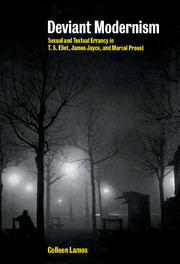Book contents
- Frontmatter
- Contents
- Acknowledgments
- List of abbreviations
- Introduction
- 1 Straightening out literary criticism: T. S. Eliot and error
- 2 The end of poetry for ladies: T. S. Eliot's early poetry
- 3 Text of error, text in error: James Joyce's Ulysses
- 4 Sexual/textual inversion: Marcel Proust
- Conclusion
- Notes
- Index
1 - Straightening out literary criticism: T. S. Eliot and error
Published online by Cambridge University Press: 22 September 2009
- Frontmatter
- Contents
- Acknowledgments
- List of abbreviations
- Introduction
- 1 Straightening out literary criticism: T. S. Eliot and error
- 2 The end of poetry for ladies: T. S. Eliot's early poetry
- 3 Text of error, text in error: James Joyce's Ulysses
- 4 Sexual/textual inversion: Marcel Proust
- Conclusion
- Notes
- Index
Summary
Most of us are somewhat impure and apt to confuse issues; hence the justification of writing books about books, in the hope of straightening things out.
T. S. Eliot, Selected EssaysEvery emission of speech is always … under an inner compulsion to err.
Jacques Lacan, SeminarT. S. Eliot's critical writings are a consistent, sustained attempt to identify and weed out error from the practice of literary criticism and to establish normative criteria for English poetry and poetic drama. In his words, Eliot was always trying to “straighten things out,” yet his own works are energized by errant tendencies that are bound up in various ways with the norms which they violate. Although Eliot rarely hints at sexual perversion, the types of error that he censures are closely implicated with errant sexuality and, more broadly, with transgressions of social order. In many instances, Eliot wanted his readers to infer the larger moral, political, social, and even sexual significance of his literary criticism. Indeed, gender and sexual errancy are crucial to his judgments of error, even those that seem purely aesthetic.
Eliot's often local assessments of the mistakes of poets and critics possess a general, theoretical coherence. In order to demonstrate their systematic character as well as their larger ramifications, I have grouped Eliot's judgments of literary error in his critical prose into four categories which I term perversion, inversion, impure mingling, and dissemination.
- Type
- Chapter
- Information
- Deviant ModernismSexual and Textual Errancy in T.S Eliot, James Joyce, and Marcel Proust, pp. 17 - 54Publisher: Cambridge University PressPrint publication year: 1998



